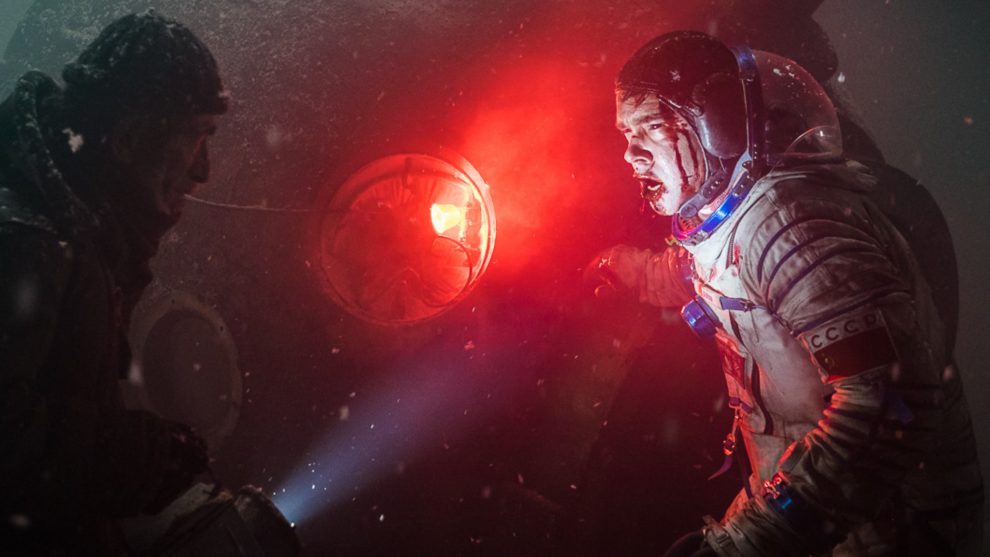When in 1957, the Soviet Union launched its first satellite named “Sputnik I” into the earth's orbit, it was quite a shock for Western science and politics, as its opponent had come true when it claimed it wanted to prove it superiority over the West, especially the USA. Regardless of the ideological context of the Sputnik-missions, their relevance for the exploration of space and in general scientific progress is undeniable, launching a hope as well as concern for what the darkness of space could hold in store for mankind. Even before these events, these concepts defined the foundation of novels and films dealing with space as the “new frontier”, its possibilities and its challenges. These possibilities may also have been the main inspiration of Russian director Egor Abramenko's feature debut “Sputnik”, a story told within the historical context of the Sputnik-missions, dealing with the idea of the experience of exploring the universe changing mankind and how we might lose control over our own bodies, as well as our world possibly.
When psychiatrist Tatyana Klimova (Oksana Akinshina) is asked to interrogate a patient by the Russian military, she is stunned to find this person is none other than Konstantin Veshnyakov (Pyotr Fyodorov), a cosmonaut who, according to the media, is still on a mission in space. As she is soon informed, he and his colleague returned to earth a few days ago, their ship had crashed and Konstantin's colleague was badly mutilated, which could not have been caused solely by the landing. Tatyana starts to interview Konstantin, closely observed by a group of high-ranking officers and scientists, but soon suspects, she is not given the full truth by those in charge.
To her shock, she learns the two kosmonauts brought an alien life-form back to earth, some kind of parasite which is now nesting inside Konstantin, only to come out at night, looking for prey. While Tatyana wants to help separating the creature from its host by all means, the military already has other plans for the alien.
Over the course of his career, Abramenko has gained much experience working at the sets of science-fiction movies such as Fyodor Bondarchuk's “Attraction” as well as his own various short features. In fact, his 2017 short film “Passenger” can be regarded as a predecessor to this story as the design of the creature looks very similar to the one in “Sputnik”. Considering this background and level of preparation, “Sputnik” is a very polished film in terms of its aesthetics, with its creature design and the effects being possibly the best aspects of the whole feature. When the creature appears for the first time, slowly making its way out of its host's body, it adds a sense of dread to the story, to an atmosphere which is already tense due to the claustrophobic setting of the military base.
However, it would be unfair to limit a story such as “Sputnik” to its aesthetic and formal features. While it surely shares a lot of common ground with the likes of the “Alien”-franchise and many others, there is no denying its idea of the link between the character and the creature is quite interesting. Again, similar to the aforementioned title, there is a strong bond, a “symbiotic” relationship, as it is suggested several times in “Sputnik”, between Konstantin and the creature, a shared mind as well as a shared memory. Consequently, the predatory impulses of the alien might also be part of this shared experience.
Another feature to point out in “Sputnik” is how Abramenko manages to implement the ideological and historical context within his feature. While in “Alien” the powerful Weyland corporation aimed to control the alien for military and commercial possibilities, the representatives of Socialism first and foremost stress the idea of controlling the alien life form. Controlling the narrative of the space mission as well the discovery of an extraterrestrial is the prerogative of the science and military, shaping the creature according to its own needs, a catastrophic thought, no matter what ideological context we are talking about.
In the end, “Sputnik” is a solid effort, excelling in terms of creature design and effects. Egor Abramenko has managed to direct a feature which offers a good amount of scares and atmosphere, while not overly diverting from narrative and thematic formulas of other works of the genre.















